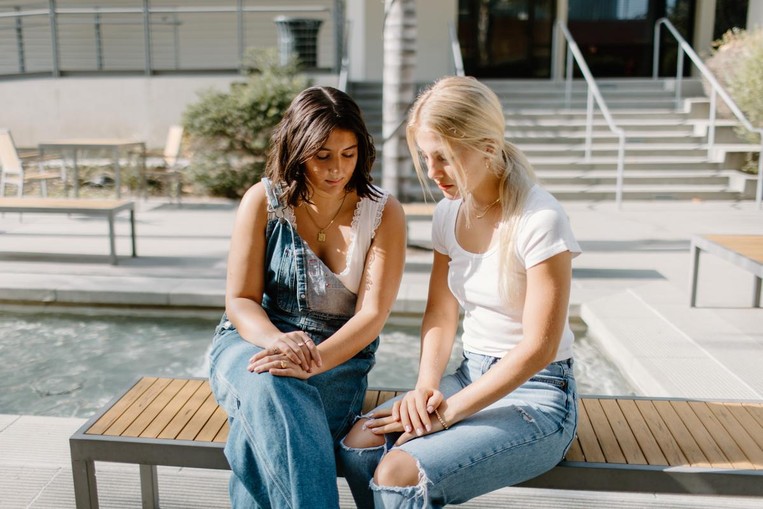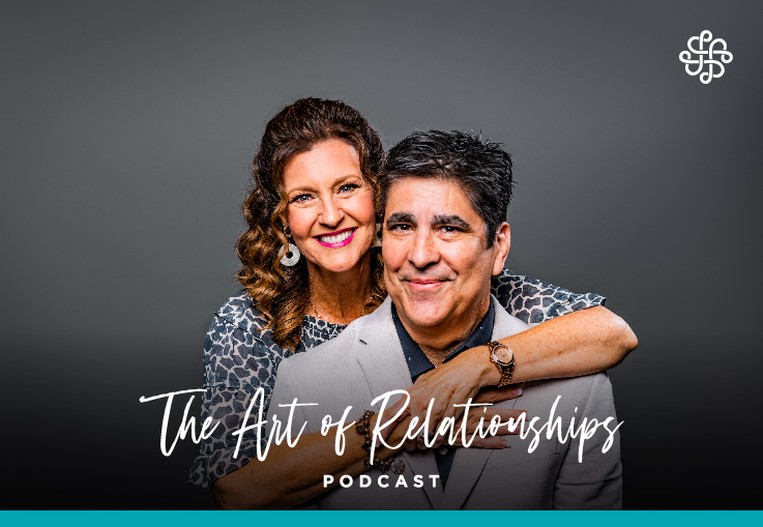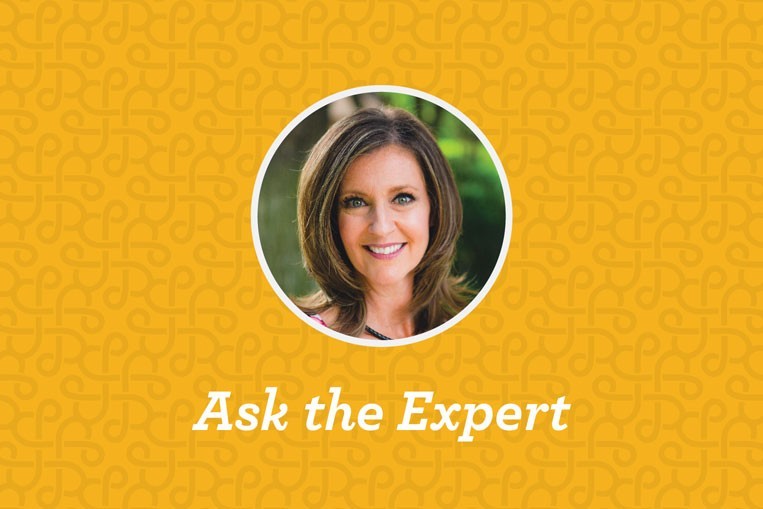You Asked, We Answered
The Art of Relationships Podcast - May 3, 2023
Topic: Communication, Conflict, Dating, Emotions, Singleness
Speaker 1: Welcome to another Art of Relationships podcast. We are grateful for listeners like you. Let's get right into it.
Chris Grace: It's good to be back here for another podcast with Alisa, my beautiful bride.
Alisa Grace: Hello.
Chris Grace: And I'm Chris. It's just one of these joys, Alisa, that we get to talk about relationships and questions. I think working with college students is awesome because many of them are in the middle of relationships, right?
Alisa Grace: Or wishing they were.
Chris Grace: Yeah, or wishing they were. And oh my gosh, there's so many cool, fun things. You find your partner, or you find that person that gets you, or hears you, or understands you. It's a fun time in life, isn't it-
Alisa Grace: Yeah, it's great.
Chris Grace: ... when you're dating. And then for some, that finding that other person and dating is the worst thing in the world, right?
Alisa Grace: Oh, some of them are really hurting because they want to be in a relationship, but sometimes they're just not being asked out. They don't know what to do about it. But gosh, we get a lot of questions about dating.
Chris Grace: Yeah. And so a couple of times what we've done, and I think this is really fun, is we have a class on relationships. And we have students in that class write in questions, but we take questions all the time, whether people just email a question in or they text a question or they submit a question online. So at least there are some out there that just stand out. And let's address a couple of these when it comes to dating relationships or just relationships at the beginning stages, let's say, or whatever they're at. So do you have any good questions that came in that stood out to you?
Alisa Grace: Well, there was one that came in, but this one is actually about a serious dating situation. And they said, "How do you help a serious dating partner who has low self-esteem or self-image?"
Chris Grace: Oh, boy. Yeah. Man, that's a tough one.
Alisa Grace: That's a big one.
Chris Grace: Yeah, because you wonder how it plays out. Why are they asking that question? Is it because the other person is constantly deflecting like, "Oh no, I'm not that good," or are they really struggling with accepting compliments and for some reason they just ... Because I think somebody that rejects or doesn't accept a compliment, it might be based upon the fact they don't feel good about themselves, right?
Alisa Grace: Mm-hmm.
Chris Grace: What is esteem? To have esteem for oneself could also be seen sometimes, I think inappropriately, as, "Oh, that's what Jesus would be. He wouldn't lift himself up. He would be just a quiet nobody in the room." I don't think-
Alisa Grace: So false humility? Is that what you're saying?
Chris Grace: Yeah, a little bit of false humility that sometimes maybe people get stuck in that. So is the person struggling with false humility? They're always just wanting to defer, they don't feel good about themselves maybe in another realm.
Alisa Grace: Looking for a compliment?
Chris Grace: Maybe, yeah. Maybe there's struggles like that. But let's just assume that they really do just lack self-esteem in a way that says, "I'm not good enough or I'm not worthy." To esteem somebody at any time is to lift them to a point where we say, "You are valuable. You are worthy. In fact, I want to esteem you. Let me give you my blessing or my gifts or my presence. And I'm going to bring you up in esteem." So in a relationship, what does that mean? Well, if a person says, "My partner doesn't have any self-esteem" ... Is that what they said?
Alisa Grace: Mm-hmm.
Chris Grace: "And they're struggling with that," I guess you have to maybe go a little bit deeper and say, at the deep, most extreme end, if they are really just unable to appreciate not only how God made them and who they are, they probably need to get some help by, how does God view you? It might be, how do you view yourself? Where did your esteem come from? What happened in your family? What happened with your parents? Why are you there? Why was somebody hurting you, maybe calling you whatever, and so therefore you believed that? And that might take therapy. So maybe let's assume this person isn't at the therapeutic level, but getting close. What do you think?
Alisa Grace: Yeah, that's a great distinction. It could just be that maybe they're having some self-doubts that it's not at the clinical level, like you said, but just having self-doubts. And so really speaking words of affirmation and appreciation. But what we find in research about that is that the more specific you can be in your words of compliments or affirmations, instead of generalizing it, the more meaningful it'll be. So instead of, "Wow, you're really a good friend and I really appreciate what a good friend you are," well, that's kind of general. But to say, "You know what? You are really thoughtful. The way you sent me that card that just was saying, 'Hey, I'm thinking about you. I know you're having a hard week,' that was really thoughtful. And you're really good at noticing when I'm down. And you rise to the occasion to speak to me and to notice that. And I really appreciate that about you." But it's very specific.
Chris Grace: Yeah. So I love that, Alisa. It's bringing words of affirmation, kindness, affection.
Alisa Grace: But let me ask you this, Chris, what if it's a result of, let's say, sin or bad behavior in their life, and they do feel bad about themselves, and so how do you address it from that point as a dating partner?
Chris Grace: Yeah. From that angle, if the other person ... and I guess if you know that. The point is, you're going to have to discern and come up with and maybe take some time to go to a vulnerable, safe place and in a time in which the other person can start to share, what is it that's causing them to do this? Now, if the answer is it's because of their behavior, they're doing things they shouldn't be doing and they just feel like a rotten, horrible person, then I would say, "All right, they don't really, truly understand something like forgiveness." What is forgiveness, right? How does God view us? What does it mean to be a sinful person to live in a world in which I struggle with some things? But the person who really wants to try and change and just is having a hard time is very different than the person who just sins and has given up and says, "I don't really care."
Alisa Grace: Good point.
Chris Grace: So I would say it's that person that if they're struggling in this, they really need to understand that we're in a relationship with a God that knows and understands and has told us, "How many times should I forgive my brother? Up to seven?" And I think Jesus' response is always clear: "No, you continue to forgive up to seven times 70." And of course that number is isn't really the important thing. The idea is we are serving a God, we're with a God who understands our brokenness, our messed-up-ness. And now, if that person's low self-esteem is because they've simply given up and they just have lived and leaned into this life of sin and they're like, "Ah, whatever, I don't care anymore. I'm a bad, horrible person. I'm going to keep doing this," then I think you have a different issue. So it probably depends on your heart, huh?
Alisa Grace: Yeah, I think so. Definitely.
Chris Grace: I think, too, low self-esteem can come from some other hard places. And ignoring the clinical ones, like I said ... Let's just real quickly say this. The clinical ones that we're talking about is if you grew up, you were bullied a lot, being bullied can cause a low self-esteem, right? Or maybe there's some sort of abuse that went on, verbal. Those kinds of things are really hard to do. Maybe there's some sort of stigma or discrimination or prejudice or something that has deeply impacted you and it continues to have an impact in relation. Then I think those are what you and I are calling clinical.
Alisa Grace: Yeah.
Chris Grace: You probably need help with that, right? And you need someone who's pretty good at understanding how to draw somebody out of that. How do we view ourselves differently? But there could be low self-esteem also, at least that's maybe not quite clinical, but it's based upon maybe not how I was raised, but what's going on in my life right now: "I can't find a job, I'm stressed out. My, I don't know, degree isn't working out. I can't figure out how to pass this class." And maybe their low self-esteem is ... We had one is about they can't pass a class. We had one student who could not pass a particular class. I don't know if I should say it or not, but she just came to us and said, "I can't pass this class. I've taken it four times and I can't pass it."
Alisa Grace: Oh, no.
Chris Grace: And their self-esteem was starting to be affected. Now, the good news was, I think this person handled it very well. And they realized, "All right, it's specific to this. I'm not bad." But self-esteem issues that come from that really need a proper, I don't know, maybe a person coming and saying, "What is going on? Are you okay? What's happening here? This doesn't define you. Let's process this," and a lot of grace is being shown. So that's one way to deal with that.
Alisa Grace: Yeah [inaudible]-
Chris Grace: What else?
Alisa Grace: Okay. I think that's really good. Okay. I have another question for you.
Chris Grace: Okay, all right.
Alisa Grace: Okay. This was actually sent in to us for the podcast. It actually says, "Thank you so much for your podcast. You guys are awesome." It does really say that. Thank you. That's so nice. Anyway, it says, "I have a question. Is it okay and healthy for a Christian to date more than one person at the same time?" And they clarified this. It says, "I started dating a girl recently. And even though things are going good and she likes me very much, she asked me if it would be okay if she dates more people at the same time. And apparently because at the same time to feel that she chooses me by having other options."
Chris Grace: Yeah. Okay. Yeah. Well, to me, it's always going to come down to the definition of the word relationship or dating. So let's put it this way. If you are romantically, deeply involved and your relationship is not casual dating, then yeah, I think it's wrong. I mean, that is, if there's an implied consent that you and I have an emotional connection that there's a romantic part to our dating relationship, and in that way, there's a sense of exclusivity, right, we are exclusive with each other, I would say that's more than casual dating. That's serious dating. And to have more than one is not right.
Now, can you date casually more than one person? I think it all comes down to the word casual, right? I mean, if a person is casually dating a person, that is, they've seen them three or four times, which is more than one but fewer than 10, I would say, "All right, fine. You're dating, you're casual. You've gone out here. But they don't always need to pay attention or know exactly everything I'm doing in life yet because we're just casually dating." I think it's okay to maintain friendships so long as those other friendships are also casual, defined as friendly, friendships, getting to know. I mean, that's the whole point about casual dating, is getting to know whether or not you're connected and like somebody and you have shared similarities and values and humor. I don't know, Alisa, what do you think?
Alisa Grace: Yeah, I completely agree with you. I think if you've just started going out with this person ... if you've been going out for, let's say, two months or so, then by that time you should know if you're ready to ... "Hey, I'm ready to be exclusive and to see where our relationship's going to go." You both need to be on that same page. And if the other person by eight weeks in, you've been seeing each other regularly throughout the week, multiple weeks, and they're not ready to go there, then maybe you might be dating the wrong person. Maybe they're just not there yet for whatever reason. And maybe they'll never be. You never know. But it seems like, by what you said, you've been going out for a little while. If you're ready to be exclusive and they're not, then maybe you need to re reevaluate the relationship.
Chris Grace: Yeah, I think so too, Alisa. I think you also need to probably have that conversation. It's so important to be clear upfront by making the other person understand where you're at in a relationship. Some people fall in love really easily. And after three or four dates, in their mind, they can take this to a deeper level, like, "I am really falling in love with this person." Well, either they need to be prepared to either hold that back and wait to see if the relationship progresses and catches up-
Alisa Grace: Catches up.
Chris Grace: ... and then I have to be willing ... suppose ... And this was probably the case for us. I was falling in love with you very early on. And so I had to make sure that if you were dating somebody else or saw somebody, that that was appropriate for the casual dating stage. In fact, we'd say, "Oh, we're just really good friends." And so if you would call me and say, "Oh, I went bowling with a guy," I'd go-
Alisa Grace: "Oh, really?"
Chris Grace: ... "I'm sure that was a fun date." But I had to get used to the fact that, "Well, we are just casually dating as friends, and I have nothing over her, even though" ... But the danger there is, like you said, if the relationship isn't caught up to the depth of my feelings. And that might require me at some point, which it did, to say, "Hey, I would like for us to start 'dating,'" which implied, "It's just you and I."
Alisa Grace: Exclusivity.
Chris Grace: And if you do have friends at this point, guy friends, that's fine. But going on a date with a guy friend would, in a sense, make me feel like, "Oh, wait a minute. We need to redefine dating." Right?
Alisa Grace: Yeah.
Chris Grace: And luckily, that didn't happen. But I think maybe that's their concern.
Alisa Grace: Yeah, I think you're right. Good answer. Good answer.
Chris Grace: All right. Got any more?
Alisa Grace: Okay, yeah. This is from another podcast listener.
Chris Grace: Sure.
Alisa Grace: And yeah, I don't know if it's a guy or a girl. Can't tell. Anyway, it says this: "How much attention should one expect from" ... Oh, it must be a girl. "How much attention should one expect from a boyfriend or a girlfriend after dating one year? Should you expect to be prioritized over their friends or hobbies?" They've been dating one year. What kind of priorities should you be ... should you be over their friends and hobbies?
Chris Grace: Yeah, again, boy, a lot of this is going to come down to definitions and conversations and coming to understanding and agreement. It's almost as if the first answer is easy and simple. If you are in conversation with another person on a regular basis and you're sharing your heart and you guys know and understand, then you don't run into this problem. However, that doesn't necessarily help here. So it goes like this, the way I'm hearing this is, the other person sounds like they're feeling a little bit excluded-
Alisa Grace: Ignored?
Chris Grace: ... maybe a little bit ignored or maybe not important. And so if you're dating for a year, there's an implied assumption there that, "You are important. We're only dating each other." You don't stay together with somebody for a whole year that doesn't have the potential to be somebody you're going to make a lifelong commitment to. And if you're feeling after one year of that kind of dating, again, it's defining what they call dating, what they mean by that, if somehow or another that other person is feeling left out, not as important, like you said, ignored, maybe you have a different definition of year-long dating. The other person might be thinking, "Well, this is casual and I want to continue to maintain my friendships, because they're important to me. You are important, but still you have to get in the line." Then I think a conversation needs to be had.
Alisa Grace: So if you've been dating for one year, how important do you think it is, those two people in their lives, to keep friendships and hobbies going versus cutting all that off and spending all their time with their dating partner? Because I think that can be the danger.
Chris Grace: Mm-hmm, the danger being that some are saying what? What's the danger, do you think?
Alisa Grace: I think the danger is that as dating partners, we would get so wrapped up in each other that we cut out our friends-
Chris Grace: Oh, I see.
Alisa Grace: ... we cut out our other interests so that we can just spend all our time together. And when you're dating, I think it's important to still keep your friendships and making regular time with your friends and your hobbies as well as your dating partner. And maybe part of this could be, if you're in college, you are also working in factoring in school and family, and you have a lot of pulls on your time and your attention. And so to expect your dating partner to put all those other things aside and focus exclusively on you, I think is a bit unrealistic and unhealthy because I think you need to keep the balance in there.
Chris Grace: Yeah. I think one key word you made, Alisa, is that they're college age, let's say. Let's say they've been dating a year, but that kind of dating, they don't yet know if it's going to result in marriage. But to date for a year is a long time. And it starts to cause these kinds of problems, right?
Alisa Grace: Yeah.
Chris Grace: So suppose you're 25, you're out of work, you've been dating a year. Well, you're probably-
Alisa Grace: You mean out of school?
Chris Grace: I mean out of school, sorry. Or you're out of work too, so you're out of work, out of school. But let's suppose you've been dating for a year, but you're both serious about dating, you've had that com that conversation, well then, yeah,-
Alisa Grace: That's different.
Chris Grace: ... the other person is becoming a priority to you. And you better start cutting things out. Again, that's because the serious nature of your degree to which you're dating determines whether or not you cut out other things and friends. If I'm dating somebody casually for a year or two since high school or dating since high school, I need to continue to grow and develop, but I better tell that other person, "Listen, you're important to me, but I'm growing and developing in a lot of other ways. And I'm not quite sure if we're going to get married or not, just like you aren't. That's why we're still dating. And so therefore, for me to grow and do, I need to keep my friends and keep doing these things."
Alisa Grace: That's a great point.
Chris Grace: Yeah, what's the point? Why are they feeling ignored? Is it because they maybe felt you've communicated more love and more potential for our future than the other person-
Alisa Grace: And they're not returning it.
Chris Grace: And they're not returning it?
Alisa Grace: Ah, that's interesting. Very interesting. Well, those are some great questions that we got to address today, Chris. I think we're good for today.
Chris Grace: Yep.
Alisa Grace: Okay. Well, thanks for listening to The Art of Relationships. Don't forget to listen to us on your favorite platform, Stitcher, iHeartRadio, Spotify, couple of them. And click that subscribe button and give us five stars. We'd love it if you did that. And we'll see you next time.
Speaker 1: Thanks for listening to The Art of Relationships. This podcast is only made possible through generous donations from listeners just like you. If you like it and want to help keep the podcast going, visit our website at cmr.biola.edu, and make a donation today.
_staff_profile.jpg)
The Art of Relationships Podcast
The Art of Relationships podcast, hosted by Dr. Chris and Alisa Grace, is centered on helping you build healthy relationships and marriages. In this podcast, Dr. Chris Grace and Alisa Grace weigh in on how to navigate the complexities of relationships in our culture with biblical wisdom and scholarly research. Listen to get practical insights on relationships, dating, and marriage.

 An Age-by-Age Guide to Singleness
An Age-by-Age Guide to Singleness
 Listener Questions Answered, pt. 1
Listener Questions Answered, pt. 1
 The First Step for Effective Communication: Reclaiming the Power of Words
The First Step for Effective Communication: Reclaiming the Power of Words
 Should We Date Even Though I'm Not Attracted?
Should We Date Even Though I'm Not Attracted?